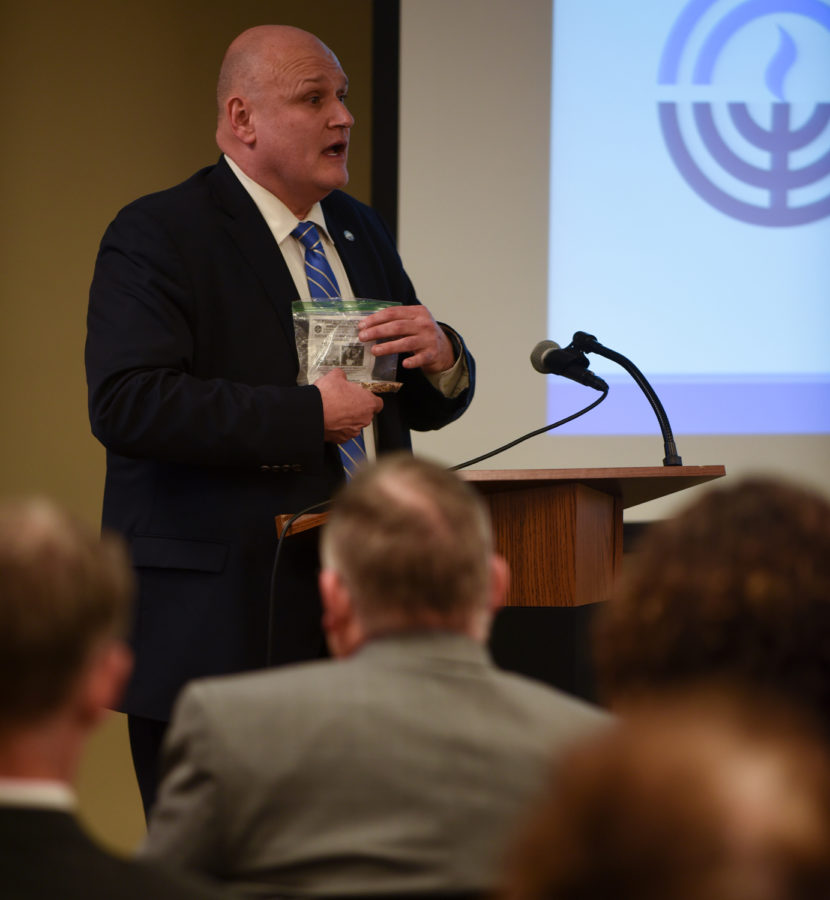FBI explores the roots of hate crimes at Lawrenceville meeting
Knox Coulter | Staff Photographer
Brad Orsini, director of Jewish Community Security at the Jewish Federation of Greater Pittsburgh and ex-FBI employee of 28 years, shows a bag of birdseed with a packet of KKK propaganda inside. The birdseed is used so they can throw them from vehicles onto the street without them blowing away.
January 29, 2019
Only hours after gunman Robert Bowers killed 11 congregants at Pittsburgh’s Tree of Life Synagogue, an unknown perpetrator defaced a Jewish-owned storefront in Lawrenceville with swastikas and anti-Semitic slurs.
“We’ve seen a really disturbing trend in Pittsburgh in the last six months with hate-related incidents,” Dave Breingan, the executive director of Lawrenceville United, said.
Lawrenceville United is a nonprofit organization dedicated to promoting inclusivity throughout Lawrenceville, one of the largest neighborhoods in Pittsburgh. The organization invited FBI representatives to the Goodwill of Southwestern Pennsylvania building Monday night to teach around 100 residents how to spot signs of people preparing to commit hate crimes, which have been on the rise in Lawrenceville and across Pittsburgh since the Tree of Life shooting.
“We’re not gonna solve hate here tonight,” Breingan said. “But we are gonna give you the tools to identify hateful incidents and report them properly.”
Local law enforcement identified 12 hate-related incidents in Lawrenceville in the past six months, including three acts of vandalism on minority-owned businesses, dissemination of at least seven different white supremacist fliers and the appearance of swastikas and KKK symbols throughout the neighborhood.
According to FBI supervisory intelligence analyst Matthew Trosan, some of these incidents were illegal hate crimes, but some, including the fliers, were legal expressions of free speech. While perpetrators of hate crimes knowingly commit an illegal act of violence for hateful reasons, Trosan explained, “hateful incidents” can be anything an individual or community member deems hateful or threatening.
“There’s a lot of gray area with laws,” Trosan said. “It’s not always easy for people to differentiate hate crimes and what we call ‘hate incidents.’”
Still, “hateful incidents” can often signal an impending threat, Trosan said.
Trosan led the audience through a series of images to highlight “hateful incidents.” One depicted a white man wearing a T-shirt that read “F-ck Islam,” while another showed swastikas spray-painted on a garage door.
The FBI collects evidence of these hateful incidents because they often lead to hate crimes, Trosan said. Since 9/11, the FBI has become far more concerned with predicting and intercepting violent threats rather than simply reacting to them once they’ve happened.
“Identifying threats is no good once people have already been killed,” Trosan said.
But the problem, according to fellow FBI intelligence analyst John Pulcastro, is that the FBI is not legally allowed to surf the internet or comb the streets for anything that qualifies as free speech.
“That’s where you come in,” Pulcastro said, pointing to the audience. “You have to report to the FBI, or to your local police department or to an organization like Lawrenceville United, that you saw something that felt threatening to you or another community member. Only then can we investigate it.”
Pulcastro said the FBI predicts hate crimes based on behavioral indicators, such as aggression in everyday life, social ostracization and increased consumption or sharing of propaganda. That propaganda can come from organizations ranging from ISIS to Identity Evropa, a white supremecist organization that plasters images of the Statue of Liberty on all its merchandise.
Many of those who committed hate crimes, including Pulse nightclub shooter Omar Mateen, exhibit such worrisome behavior from an early age.
Pulcastro pulled out Mateen’s third-grade report card, which said he had a penchant for “verbally abusive, aggressive behavior.” And in the hours after 9/11 when Matteen was in high school, he could be seen dancing through the school hallways, celebrating the attacks.
“People who commit these attacks idolize past attacks,” Pulcastro said. “These were obvious signs, but no one reported them. And unfortunately, that’s what happens in most of these cases.”
Even though more than half of hate crime perpetrators leak evidence of an impending attack to friends or relatives, according to the FBI, 54 percent of those loved ones never breathe a word about it to anyone — and 83 percent of those who do speak up only talk to the perpetrator.
“Dialogue can be a good prevention technique. It delays action on the part of the perpetrator,” Pulcastro said. “But only if it’s the correct dialogue.”
When faced with a dangerous individual who expresses extreme views, Pulcastro said a person’s natural instinct is to angrily retaliate.
“Actually, what you should [do] is calmly reason through those thoughts with them,” Pulcastro said. “A lot of these people, sadly, are victims of propaganda pushing online. They live in an echo chamber.”
Still, while talking to a would-be hate crime perpetrator can be helpful, Pulcastro said it’s imperative that people take that first step and report the incident to the FBI.
“We can sit here and despair, wring our hands and wait for the FBI to solve the problem, but ultimately it comes down to all of us to report these incidents,” Pulcastro said, gesturing to the audience. “Only you have the power to say ‘hate is not welcome here.’”
Pittsburgh residents can report hate incidents at www.fbi.gov/tips or by calling FBI Pittsburgh at 412-432-4000.








